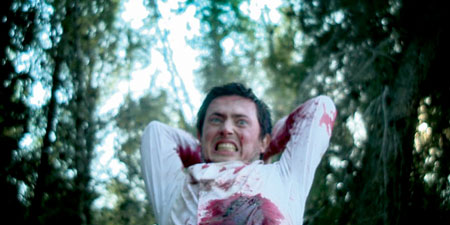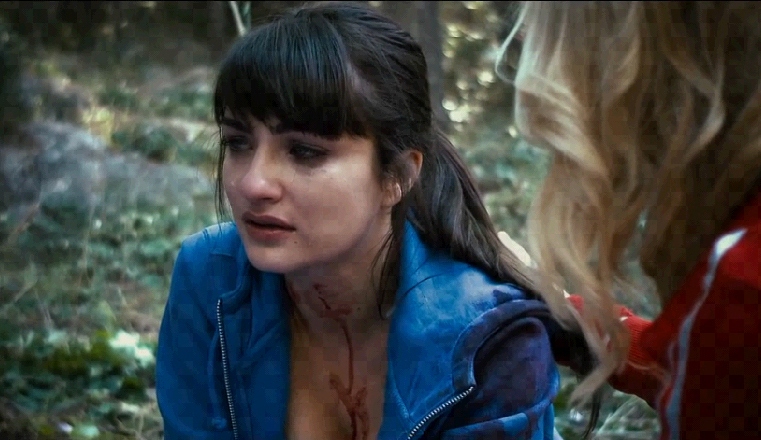RABIES: Human Nature is The Disease We Can’t Shake
 It’s hard to believe that there has never been an Israeli horror film before now, but directors Navot Papushado and Aharon Keshales have broken new ground with their unconventional horror film Rabies – which has its Canadian mastercard cialis Premiere tonight at 9:20pm. Looking back at the last half century, pop culture developed along different lines in Israel – one must remember than in the 1960s, the Beatles were banned for fear of corrupting the morals of Israeli youth. Sure, American rock n’ roll infiltrated the nation, but a 1963 Cliff Richard concert resulted in what the government saw as ‘mass hysteria’, and they were greatly disturbed by the fact that Israeli teens were clamouring for pop music about beach parties and skirt-chasing rather than songs about agriculture and nationalism. So while the seeds of change were there, and percolated in the order cheapest propecia online underground largely through literature, it took the film industry a long time to get past making films about the ideals of Zionism, self-sacrificial military heroism and the importance of having a homeland.
It’s hard to believe that there has never been an Israeli horror film before now, but directors Navot Papushado and Aharon Keshales have broken new ground with their unconventional horror film Rabies – which has its Canadian mastercard cialis Premiere tonight at 9:20pm. Looking back at the last half century, pop culture developed along different lines in Israel – one must remember than in the 1960s, the Beatles were banned for fear of corrupting the morals of Israeli youth. Sure, American rock n’ roll infiltrated the nation, but a 1963 Cliff Richard concert resulted in what the government saw as ‘mass hysteria’, and they were greatly disturbed by the fact that Israeli teens were clamouring for pop music about beach parties and skirt-chasing rather than songs about agriculture and nationalism. So while the seeds of change were there, and percolated in the order cheapest propecia online underground largely through literature, it took the film industry a long time to get past making films about the ideals of Zionism, self-sacrificial military heroism and the importance of having a homeland.
It wasn’t until the 1970s that the Israeli film industry started to take off in an international sense, and although they weren’t considered a cinematic superpower by any stretch, they did have varied output: musicals, action films, comedies and art films. TV in the cheap viagra overnight delivery 70s was apparently state-run and only consisted of one black and white channel, so movie-going was a popular activity. While there are a few overt cult obscurities like psychedelic drug film Chamsin (1972), a West German co-production featuring music by Amon Duul II, most popular were the ‘boureka’ films –fairly mindless comedies and melodramas not unlike the kinds of films Hollywood makes today (boureka literally is a type of pastry, or dessert), but with a light-hearted approach to the conflicts between the pharmacy selling viagra in israel various cultures co-existing in Israel. Films like They Call me Schmil (1975 – starring Paul Smith of Pieces and Altman’s Popeye), Boaz Davidson’s Hagiga B’Snuker aka Festival at the Snooker Hall (considered by many to be Israel’s funniest film), and of course Davidson’s adorable Lemon Popsicle (1978), which spawned at least 7 sequels and inadvertently created the teen sex comedy as we know it.
It was in the milieu that the famed Golan-Globus duo learned their trade, later to become a powerhouse in the US with their Cannon Films company. Israel tired of the boureka films just as the US was starting to notice them – so Golan, Globus and Davidson left for Hollywood, which welcomed their brand of lowbrow humour and cheap action with open arms. With home video creating the same fate for the movie theatre in Israel as it did elsewhere in the world, as well as access to more foreign (meaning: American) films, people started to stay home and Israeli production hit a slump.
In the 90s, things picked up again, and there has been a renaissance of sorts in which there is room for all manner of cinema – including horror films. While many of the films to come out of Israel in recent years still tend to focus on regional issues, a film like Rabies approaches conflict in a different manner altogether. While ostensibly not a political film, Rabies is about conflict and miscommunication – a smaller scale version of the kinds of things that happen on a global scale all the time, but no less catastrophic. Things can go horribly wrong so easily.
Many characters converge in an isolated forest that can be seen as the proverbial ‘trip to the underworld’ – it is in this arena, far removed from ‘civilization’, that each character’s strengths, weaknesses, fears, boundaries and violent potential will be tested and realized. Four tennis-playing teens on the way to the beach, a park ranger and his acerbic girlfriend, an incestuous brother-sister duo who’ve run away from home, and an unhinged cop (TV star Danny Geva) and his doormat of a partner ( Lior Ashkenazi of arthouse hit Late Marriage), the latter of whom spends most of the film on the phone leaving apologetic messages on his girlfriend’s answering machine.
The remnants of wartime are all round them in the form of landmines, creating a nice analogy for the film’s navigation of human relationships (while also adding a significant increase in tension). While numerous extended scenes of bickering – the cute, palatable form of conflict – seem frustrating at first, it becomes apparent that the bickering veils something darker that threatens to come to the surface in all of them. Bickering becomes one-upmanship, which becomes violence, which becomes death. Ironically there is a serial killer in these woods, but he doesn’t have to do much considering the characters tend to kill eachother off before he can even get to them.
Oh, and by the way, no one in this film has rabies – unless you consider the origin of the word (‘madness’), and the symptoms of the short-lived disease, which include mania, delirium, agitation, paranoia and terror leading to violent outbursts. People go mad in the woods on both sides of the pond, and with Rabies, filmmakers Navot Papushado and Aharon Keshales show us just how universal our horrible human hearts really are.
– Kier-La Janisse
————————–
RABIES has its Canadian Premiere on July 29 at 9:20pm in the Hall Theatre with filmmakers Navot Papushado and Aharon Keshales in person. More info on the film page HERE.

 July 29, 2011
July 29, 2011  No Comments
No Comments





